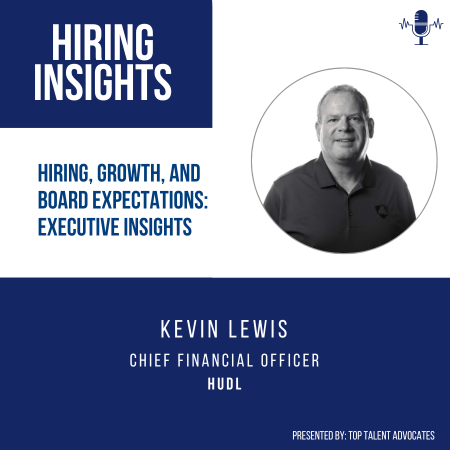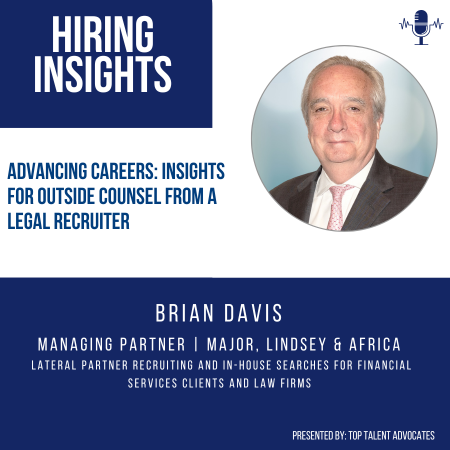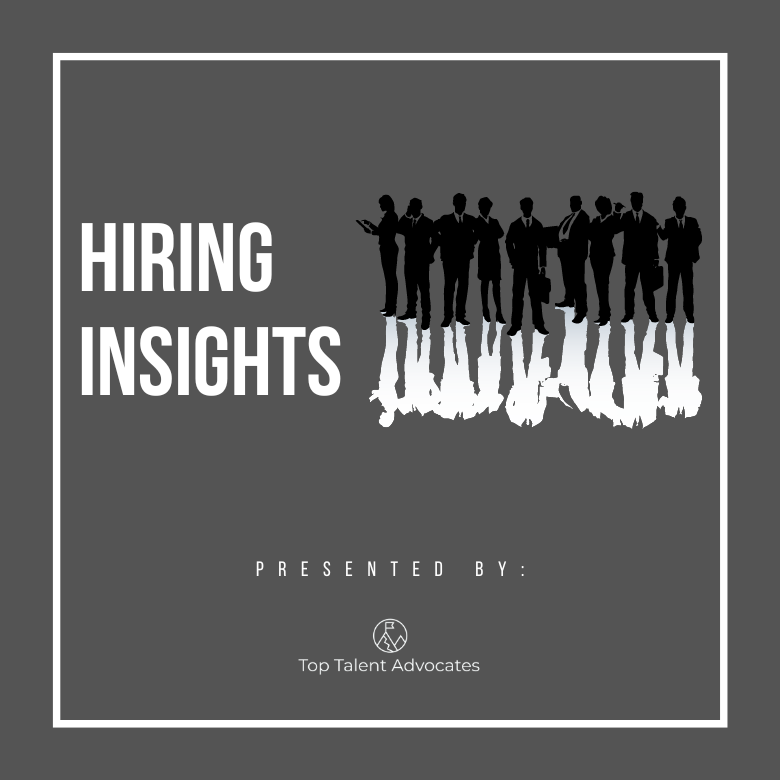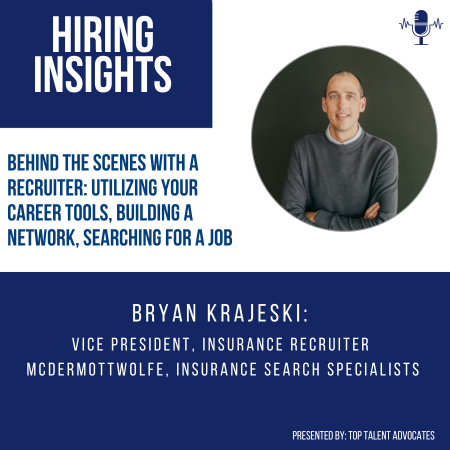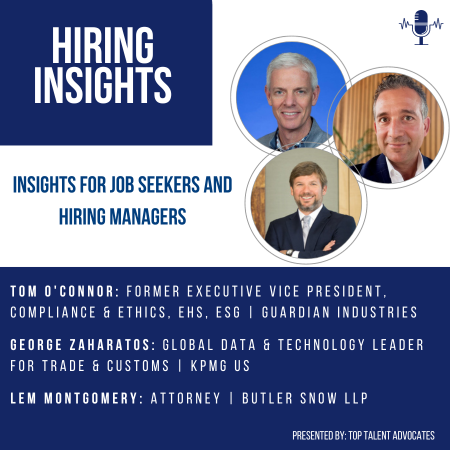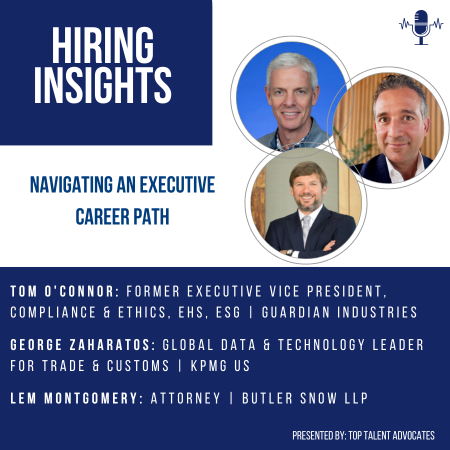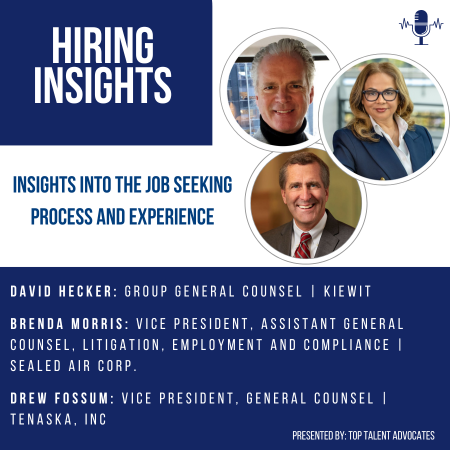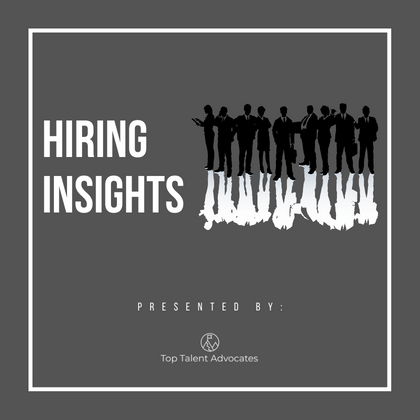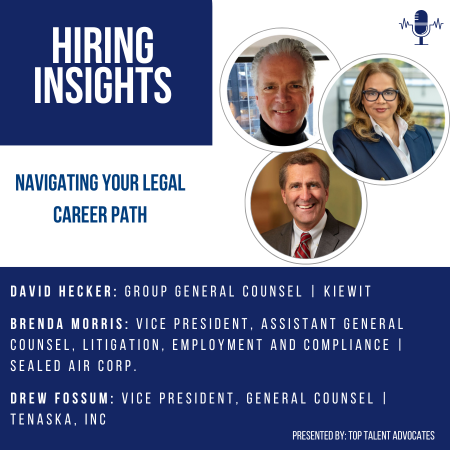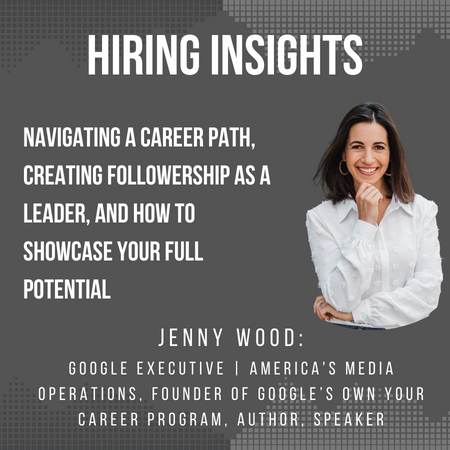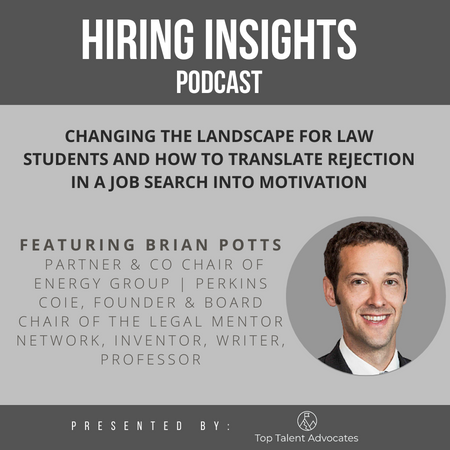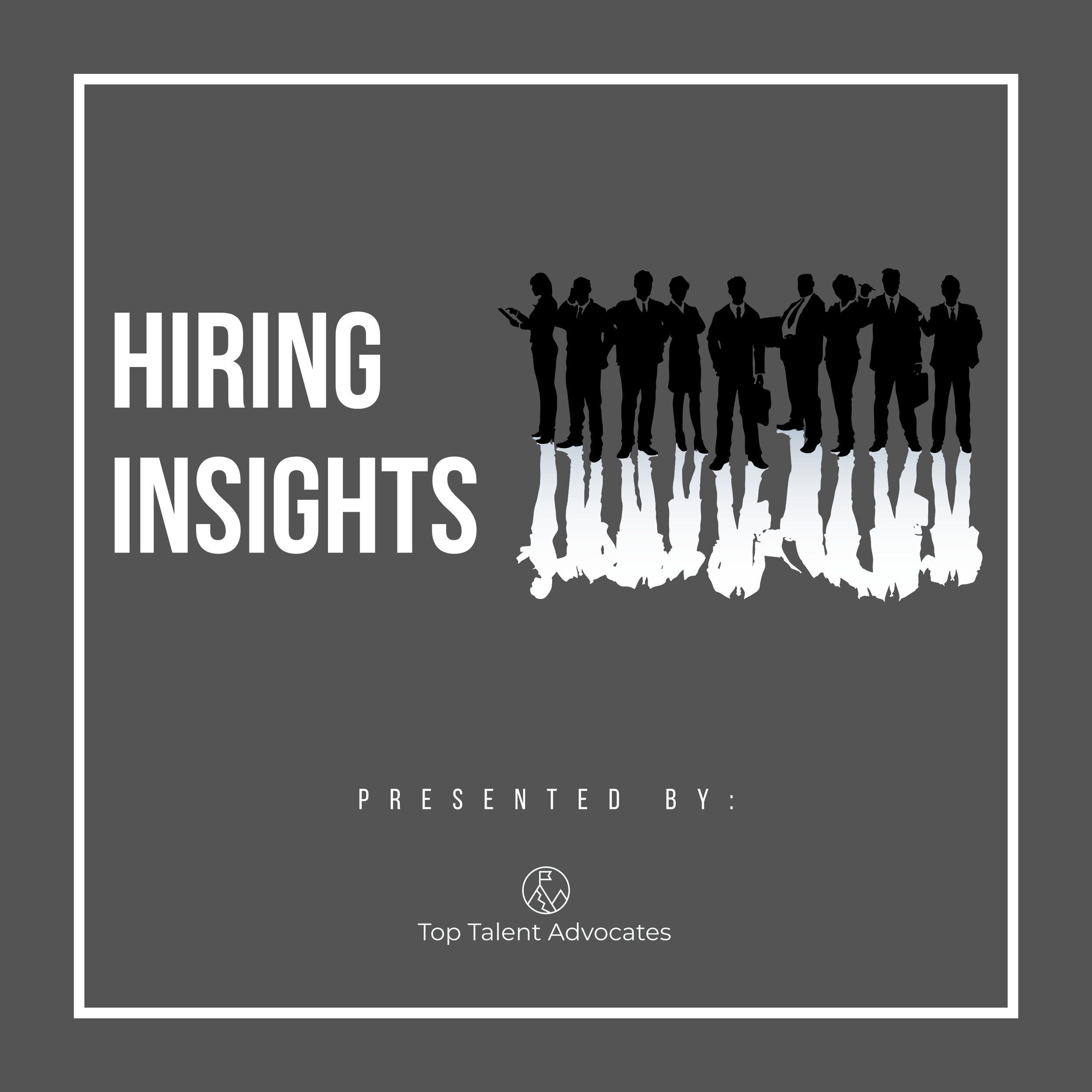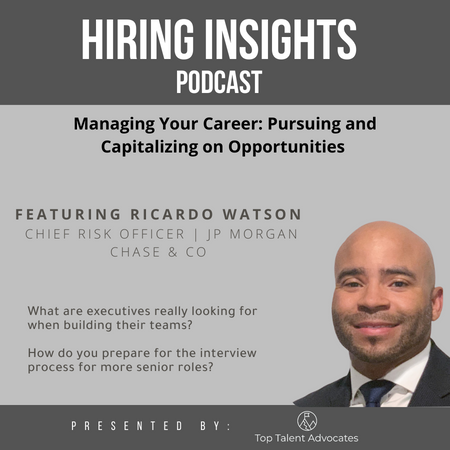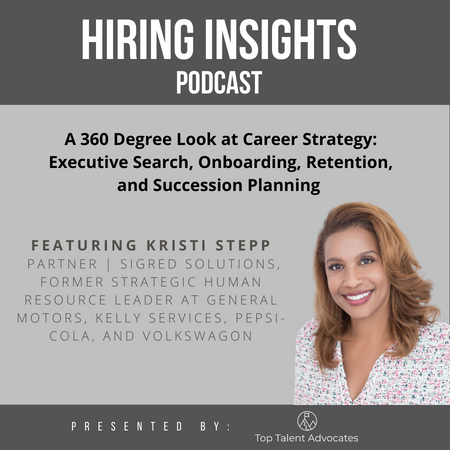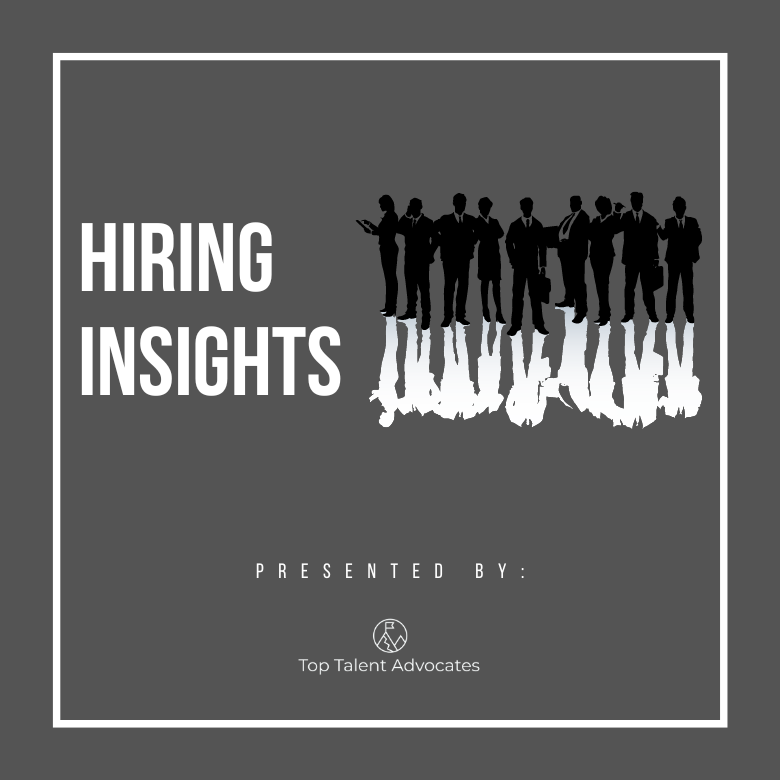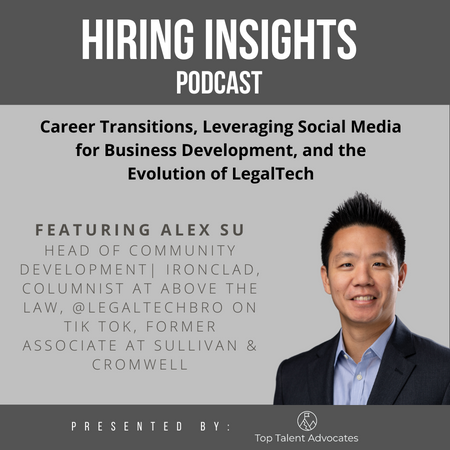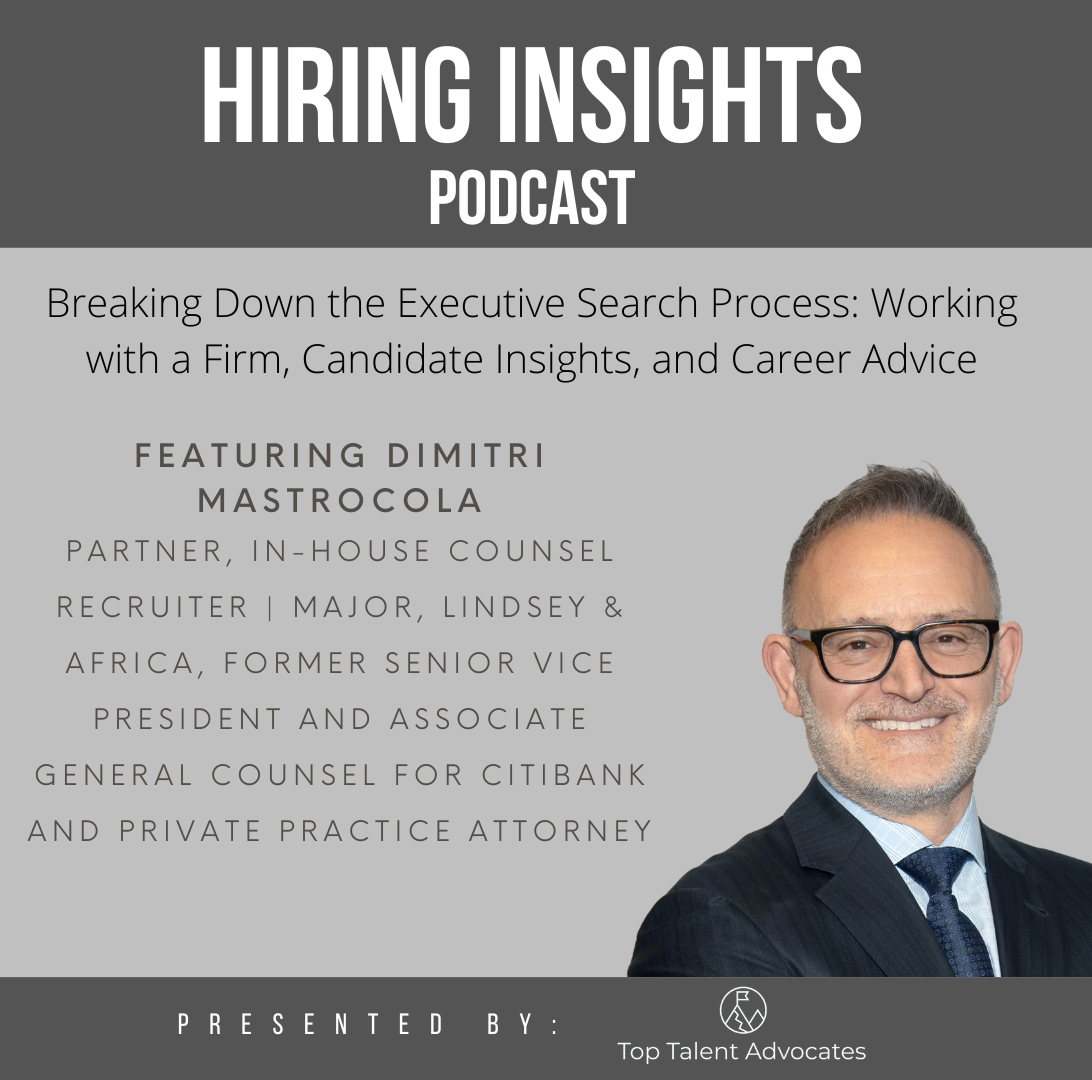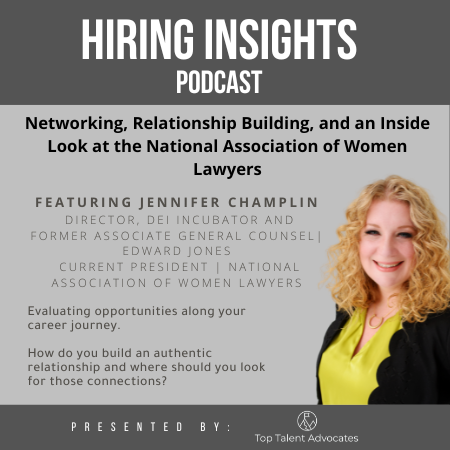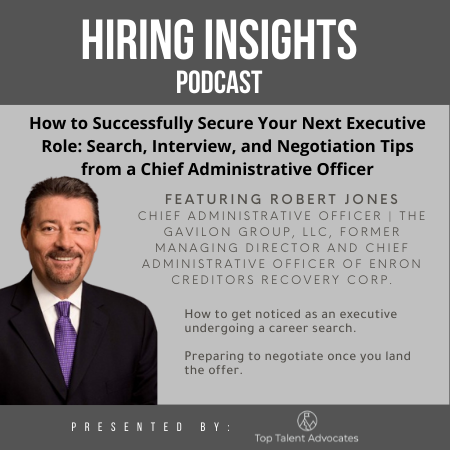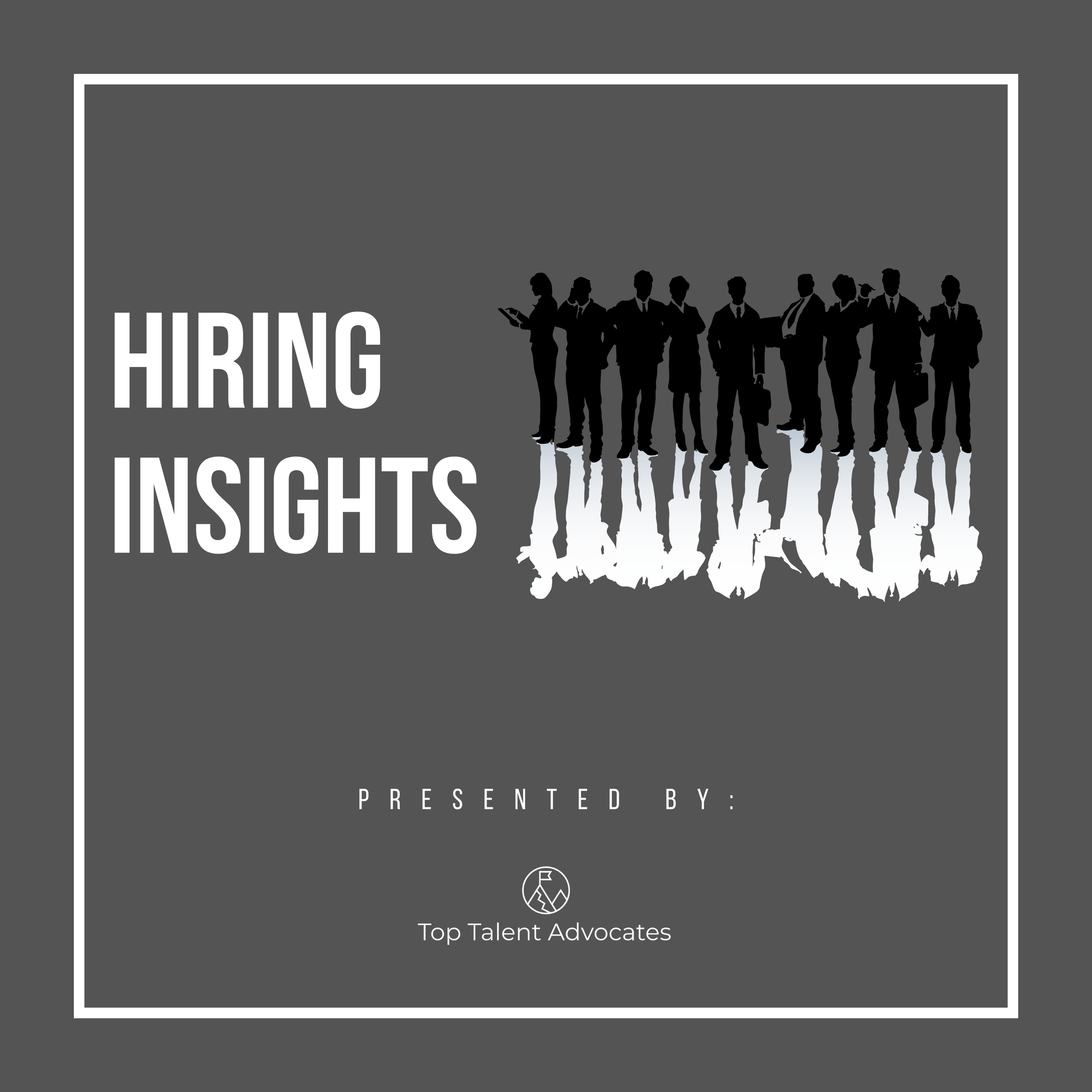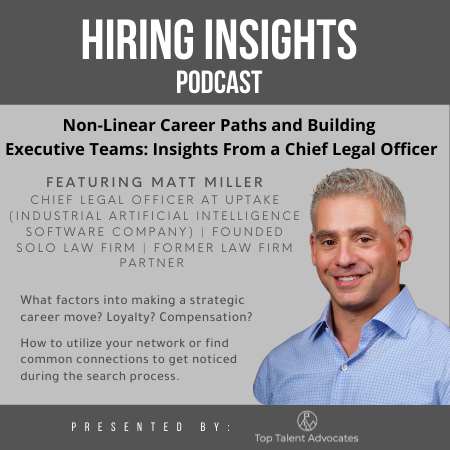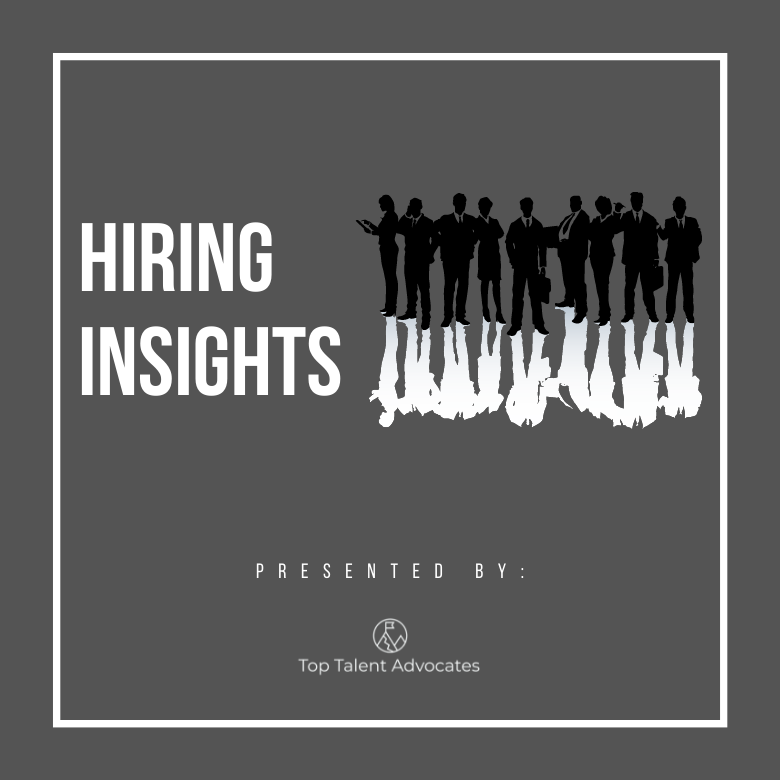[00:00:00] Richard: Welcome to Hiring Insights. The podcast that provides insight into the executive hiring process and experience, whether you are a job seeker, a people leader, a recruiter, an executive coach, or simply interested in talent, there is something here for you on the Hiring Insights. Today's episode is presented by Top Talent Advocates, where we advocate for executive and legal talent.
You can learn more about Top Talent Advocates, listen to other episodes, and hire great talent by visiting toptalentadvocates.com and clicking on podcast. Now here's your host for Hiring Insights, Mosah Fernandez Goodman.
[00:00:44] Mosah: Hi everyone. Welcome to another episode of Hiring Insights. I’m your host, Mosah Fernandez Goodman. Today I’m joined by Ricardo Watson. Ricardo who serves as the Chief Risk Officer at JP Morgan Chase, has an incredibly impressive and varied background stemming from private equity, to banking, to global operations. Ricardo who is a graduate of Wesleyan University and has studied at the Wharton School of Business and London School of Economics is not only an incredibly impressive practitioner in the financial services space, but also provides really practical and tangible insights and advice into how to manage your career and how to pursue opportunities both domestically and internationally.
[00:01:35]: Mosah: Hi Ricardo, welcome to the show. Thanks so much for joining us today. For those folks who are listening who might not already know you or haven't checked out your LinkedIn profile in advance, would you be willing to share just a little bit about your background?
[00:01:49] Ricardo: Of course, Mosah. Thank you for having me.
So again, Ricardo Watson. I'm currently a Managing Director and Chief Risk Officer, JP Morgan Chase, and I am the Chief Risk Officer for our dealer commercial services business within Chase Auto. I've been at JP Morgan now a little over six years..
I started my career in New York, in the private equity business, as an investor relations analyst. After doing that for a little over three years, I moved to Zurich, Switzerland through a Six Sigma Lean Sigma project management role. But ultimately, I was responsible for fund manager selection in our managed funded business.
After three years of being in Switzerland, which is a really, really immersive experience, I got to travel all over Europe, became a really good snowboarder along the way. But after those three years for personal reasons I moved to London where I became the Chief of Staff to the CEO of the private bank in the UK.
That actually ended up being an interesting experience, which we could talk about later if you want. But after doing that for less than a year, I moved into the investment bank where I was the Deputy Head of Strategy for fixed income anemia.
And then after that I took a role in emerging markets which took me to all over Latin America. Spent a lot of time in Mexico City, South Sahara in Africa, Eastern Europe, traveled quite a bit in my career, but ultimately after that role I got an opportunity to move to JP Morgan.
Also, I had my first kid and I wanted to come back to New York. So I joined JP Morgan Chase and my first role there before my current role was supporting the Chief Risk Officer for the company as a head of firm wide governance and strategy, which the role I did for a couple of years before eventually moving into this role.
[00:03:40] Mosah: So I was wondering if you might be able to tell us a little bit about your background, kind of what got you to where you are today, and if you could give us a glimpse into your leadership style.
[00:03:49] Ricardo: First thing, a lot of hard work and some sleepless nights. That aside, I mean, my background is fairly diverse. I'm at JP Morgan, I'm a Managing Director there but my background ranges a bit across the financial service of the spectrum. But since I graduated from Wesleyan I've always been in banking, always been a space where I just felt most comfortable.
But I've gone from private equity when I first came out of school to asset management, to private banking, to investment banking, and now I'm in consumer banking at JP Morgan.
[00:04:21] Mosah: Can you tell us a little bit about what your role is currently?
[00:04:24] Ricardo: So I'm the Chief Risk Officer for our dealer commercial services.
So imagine every play that you're driving down and you see a dealership, that physical building of cert needs several types of different financing. It's the physical vehicles on the lot. We finance that for the actual dealership. The building itself though, the real estate, we finance that.
And then we also do buy sell activity. So call that acquisition financing. And I'm basically responsible for that, whether it's risk management, operational oversight, strategic risk. The team that I manage is roughly a hundred people spread across Chicago, Dallas, Columbus, Ohio, Tampa, and we have a team in India, which I'll be heading out to in November for the first time.
But the role outside of kind of the core risk management, which is like approving and reviewing deals, we can double click into that as you want Mosah around like financial statement analysis, but it's also an advisory component. I'm heavily engaged with our CEO and our head of our business and our CFO around strategic risk, especially in a current environment where I think most folks know there are not a lot of cars out there to be purchased.
So inventory is pretty bleak. So I've spent a lot of time right now just thinking about our strategy and where we see the market going the next two to three years but the role of the Chief Risk Officer spans a lot of different hats to say the least.
[00:05:51] Mosah: That's great. And so you mentioned the size of your team and a little bit about the geographic spread. I'm sure there are a lot of sort of assets at risk, but can you tell us a little bit more about your supervisory experience and sort of what that means for you as you manage this diverse set of people and geographies?
[00:06:10] Ricardo: The supervisory component Mosah, it spans the leadership paradigm of leading a big organization, but also being kind of a coach to the team because, you know you don't want to give all the answers, right?
But then also there are some decisions that you cannot leave to certain parts of the organization, because even yesterday I was talking to our CEO about a deal and you know, his message, Ricardo we're not going to do things that don’t make any sense. And so a part of my supervisory spectrum is coaching and developing people to be able to take on this responsibility and also work without me, but also being a backstop of sort to say, I am the CRO for this business.
Ultimately, I am accountable for the risk across the entire portfolio. While I'm not responsible for managing every element of it, it all rolls up to me. So think about the regulators I have to answer to. So that becomes a part of my responsibility. We have continuous engagement with those guys, but yeah, but I think that kind of sums the gambit.
[00:07:12] Mosah: Can you give us a little bit more insight into how you've managed your career? You've worked for a number of different institutions. Maybe even start off with, you know, your high school education or your studies at Wesleyan, and then walk us through sort of how you've managed your career, because it's been interesting and varied.
[00:07:30] Ricardo: One word that comes to mind is intentional. But also hyphenated open-minded. So, and I'll try to weave that together to see why those two words mean something. A- if you think about my opening, I've always been in banking, so thinking back to my high school days I went to Cardinal Hayes High School. I grew up in the South Bronx and I was very fortunate to be in a program called Student Sponsor Partnership, which basically partners at risk junior high school kids, which I was at the time, right?
Was failing miserably in junior high school. With mentors who at this, you know, just given where the excess normally is in society were largely in banks. My mentor was at Morgan Stanley, so, you know, he sent me, paid for me to go to high school. It was an all-boys Catholic school. And for those four years with him at Morgan Stanley, he eventually got married, his wife was at City Group.
They kind of like introduced me into banking and financial services. So that's where my yearning for that came stepping to Wesleyan. That was just a great breeding ground. I went on to major in economics, which continued to just expand my purview of what banking and how the economy works together. Cause I think most people should have a grasp on given whether it's your credit card, your home mortgage, all things that, just knowing how the economy works is a good thing for anybody.
There's a space where I spend 13 years, five or six different roles and the journey, you know, sometimes, uh, which I hope to I help folks listening to this. The journey is not kind of up into the right, which most people tend to think it is, right?
There's going to be zigs and zags even steps back. And, you know, across my 13 years, whether it was where I started my career in private equity in New York and then I ultimately moved to Switzerland, that story sounds really great. But lo and behold I actually didn't want to go to Switzerland. I grew up in New York, Mosah as you know, and being a kid from the Bronx.
When the opportunity came to go to Switzerland, I was like, ah. And, you know, I remember a conversation with my director who was, you know, really, really supportive of me. He said, you have to go. They can do more for you than what I can do for you. And thinking back on this, you know, I was a 24, 25 years old at the time and one of his best performers in his team.
So, you know, having good people and then also being open-minded to things helped out. And again, so I went to Switzerland for three years, which is supposed to be, actually supposed to be a one-year assignment. And the people who joke when they say, when they tell you one is always going to be two or three, that was my first taste of doing something different that wasn't in my core type of like investment banking.
Kind of think about private equity going into the private bank or asset management in Switzerland was something I never had on the radar and I had never knew really what it was. So I was intentional that I wanted to continue to grow and put tools in my tool chest. Open-minded about the experience after somebody nudged me to go.
And honestly Mosah, like that created a space where I said, wait a second, if I could take these things that I know and put together to be good at a job. And again, at that point I was doing it, by the way, with fund manager selection, which I had no experience in. Zero. And they put me in charge of that thing.
Then the successive roles after that kind of play a similar theme about taking a skillset of learning open mindedness about the role. Like even my current role, I got to tell you, uh, when they first came to me, I was like, yeah, I don't think I want to do that. And even the role before that. So there's always been a constant, you know, pull and take.
But big open mind opportunities has that helped me a lot.
[00:11:14] Mosah: That’s tremendous. So for those folks out there looking to grow, obviously being open-minded, having a healthy degree of curiosity, what advice would you give to those folks who are looking to pursue new opportunities in preparation for interviews, let's say for those types of opportunities. Assume they come with the requisite curiosity and skill set.
Someone who's chasing that, that next opportunity what's your general advice or guidance for them, whether it be in banking or just other senior leadership roles?
[00:11:48] Ricardo: The first thing, because I know this is a struggle, right? Cause there's a wealth of opportunities out there. You can have a broad skill set so you kind of figure out what works.
Depending on where you are, my advice will differ. So I'll give you kind of if you're at a firm trying to stay within that firm and navigate that ladder, or organization. I think it's always important there to be very staunch in what you want to do and what you don't want to do. The reason why that's important is because there's tons of opportunities at companies. JP Morgan is a massive institution, right?
But I've just come to the realization that as you get more senior in your career, people want you to be more intentional about what's next. And I'll give you an example of that. So in my current role, I managed a team of a hundred people. My last role, I managed 20 people. Before I got this role, I had three things that really mattered to me.
I wanted to manage that scale, i.e. the hundred people. I wanted a lot of autonomy. In my prior roles in my career, like I was either supporting a senior guy or had a small book of work that was mine, but there was always somebody over me that guided me so it didn't create my space for me to practice my craft if, if you have it.
And the third thing I really wanted was credit approval authority. I wanted to approve deals and like own the risk that we put on the balance sheet. As roles came my way at the bank, I used those three criteria as my assessment. And what I realized at JP Morgan, at least, and most people I spoke to, they appreciated that deliberate, intentional, you knew what you wanted to do.
And if it didn't have those three things, I was like, all right, I'll listen, but I'm not really interested. And maybe if it had two or three, you know Mosah, that could kind of, but I think that's important to know now because companies want to know what you want to do. And you know, as you get more senior in your career, you know, it is a pyramid and the roles are few and far between.
But then I think, you know, if you're going to, let's say, leave an institution, my advice then does change because whether for whatever reason, you've come to the point in your career where you want to move on to another company, I think then that the rule of having three things that really matter to you kind of goes out the window because, you know, the first thing about going to a company is learning the culture.
Right? And I think you want to be able to come there to learn how they do things. So any role that gives you a wide purview, and it may not tie to your skillset, one for one. You know, when I came to JP, I came into risk management. I had no background in risk management, but it was a very wide role supporting the Chief Risk Officer for the entire company.
So, so again, I think that advice is a spectrum depending on what you want to do with your career.
[00:14:49] Mosah: Ricardo, I want to talk a little bit about the financial sector in specific, and really, I'm hoping you can share some insight into what executives are looking for when they're building their teams, right? You have a hundred folks that are on your teams, some of which you probably inherited, some of which you've likely hired, and some of which you're probably hoping to grow into new leaders themselves.
So I'm hoping you can help us peek behind the curtain of, of hiring and growing talent. You know, let's just assume for a moment that a candidate has the requisite qualifications. What, what do you think executives, such as yourself are really searching for when they're, when they're building their teams?
What are those qualities or skills beyond the right school and the right grades and the right job experiences? What are those, those prereqs that you can't exactly quantify?
[00:15:42] Ricardo: It's an interesting perspective that I've spent a considerate amount of time with my leadership team on. And one of the things that I like to anchor to is, in any candidate, whether it's the most junior role or the most senior role on my team, does this person have the ability to take the role beyond what we think it can go?
And I sit with my management team asking that question. Because I think it's so important that executives and people more senior than me at these companies are looking for people who have unconstrained potential and who say, I know what the role is meant to do, but I'm going to take into something bigger.
And in every role in my career, I've done that. And like, you know, one of the biggest compliments I ever got was from the Chief Risk Officer for the investment bank at JP Morgan. And he was saying that Ricardo just makes things better. And the thing that struck me about that it aligned to how I assess talent, right?
Are these, are you coming to a company to make it better? Not coming in and I'm saying, not saying do you nine to five, because that's like a given table stakes, but that's what executives want to know. Am I going to like empower you to go do your proverbial thing as we say, but do you have it in you? Do you believe in yourself to do that?
Because there are some tough moments in your career where, you know, like I said earlier, it's not just up into the right, like a straight shoot up. There's some down days and some days are tough and you have to be resilient and believe in yourself enough to know, I'm going to make a change. Uh, so that, that's one of the biggest qualifications that's not written on a job description, right?
That but it is not discussed as a question to you in an interview, but people are probing, looking at your mannerisms, your words, your conviction to say, all right, this person knows it. And I just believe in them. Uh, because, you know at my level or at most senior levels at companies, no one's here telling you what to go do.
You come in, whether your 60/90-day assessment, you go do your thing, the gloves are off, and that's it. And I think, you know, with that autonomy is the expectation that you're going to go change it.
[00:18:07] Mosah: That's incredible perspective. So how does a candidate demonstrate that or convey that to you over the course of either soliciting an opportunity from an employer or when they're sitting down across the literal or proverbial interview table to convey to you that that's what they want to do. Or that if you gave them a shot, that's what they could do?
[00:18:32] Ricardo: You convey it without using the words. The way you do this and get it right, in my opinion is a. you prepare, there's no more air in the room. And if you get that level of intensity, that level of focusness, and you can display that, you know, and it's not about, and like having examples of what I did in my past is helpful.
Say, no, no, I'm a change agent. Right? But you have to come into the room with a force that no, no, this is my job and I am the person here full up. So I would love to tell you that there's like a magic more than that. You know, Mosah, but take any sports analogy. You know, I'm a big sports person. You just kind of know when Steph Curry's in the moment, he's the guy.
And you can't explain how you know it, but you know it. If you consider your career a craft that you're perfecting when you get in that room, the work that you did. And you know, I like to tell people, like, consider that interview, that moment of showing that you could do this. That's your game winning shot.
However, unfortunately, like Kobe or Steph, you don't have 10,000 shots in the gym to practice this, right? You got that one moment. And whether, you know, I think one of the things I was talking to you before, this is about why I like this session and this conversation. Consider, this is one shot in the gym helping you right now to get you closer to that to be ready for that game winning moment.
[00:20:04] Mosah: So, Ricardo, a lot of the folks listening to this show are looking for insights into how to be hired by someone like you. They want to know what someone like you is looking for, they want to understand how to approach someone like you. They want to be prepared for interviews. And so I'm, I'm hoping that you can share with us at the outset of this topic, how you've specifically pursued different opportunities throughout your career.
Sometimes you get tapped on the shoulder, but my guess is that you have a couple of stories to share about how you took that intentionality and that focus and applied it to pursuing a new role. So I'm hoping you can share some of that with our, our listeners and, and give them some insight into what things they should consider doing.
[00:20:50] Ricardo: Yeah, that's fair. So I'll go in reverse order. I'll answer kind of, I'll give you a story about like one of the more trying times where I had a career change and then come back to advice on what to be doing. Cause I think that I mentioned throughout this career thing is not a straight and up into the right type thing.
It's not you know, a continued progression. When I moved from Switzerland, to the UK to London, I went to work in the private bank. And, you know, it was the first time in my career where the role was just not a good fit for me. Actually, less about the role was the manager. I had a very challenging manager at the time, and you know, I remember him telling me, Ricardo, you work too hard.
And that was a hard thing for me to digest. And also throughout the process of being there my bonus got cut in half, uh, twice. The first time I was like, okay, cool. It’s not the worst thing on Earth. Right? But the second time I remember, you know, after I got that and I told this guy, I'm not sure what message you guys are trying to send, but please let the folks know in HR the message has been received.
Even throughout that process, I had to rely on my mentors. Uh, and I've been very fortunate to have good mentors, and I'll come back to my advice on mentorship, uh, in a second. But, so in that moment, this role was going nowhere, right? And after we got over that like bonus conversation, my manager and I agreed that it was best that I move on to a new role.
He was very respectful. The fact that I had been at the company at this point 9 years from New York and Switzerland, and most people in the company knew me in some shape or form, right? They probably seem to find you a role that's more fitting to what you want to do in your career. And when he said that, I was like I kind of know, but I don't know.
So I had to step back and if, you know, and decide what did I want to do next? And I decided I wanted to work into, in a strategy role. So again, like playing off of this theme of being very intentional. I was very intentional saying any job that I want to have next had to have a strategic component into it.
I actually started looking externally for the first time and I'd probably say, yeah, I looked at Goldman for a role in the UK. That didn't work out, but then I, I kind of want to say through sheer luck this thing happened, but it was a lot of hard work that created a lucky space. If, if you get where I'm going, right Mosah?
Where I always find the harder I work, the luckier I am in life and we can unpack that as you see fit, but a role popped up And I applied for it. It was the first time since my first job that I had applied for a job and I interviewed for it and I got the job. And I think that story's important to me because it was the worst part of my career ever where I was like, is this thing not going to work out? I have this guy, I'm in this city, this country, and I had to step back.
I actually read Che Rivera's book, for those that don’t know Che it's a really good story about his motorcycle tour and what he went through and the chaos that was going around on his life. So I think we've all been there. That's the first thing I wanted to share folks at these career forks. And the main thing I had to put on was the folks in the fixed income was this resolve and intentional of why choose me.
Cause I had no background in fixed income, uh, at all. That was kind of the kicker if you trace my career. But I had a lot of intensity. I had spent hours like studying the business. Cause I was very fortunate to be an internal candidate. So I had access to all the information and that worked out for me.
[00:24:42] Mosah: When you said you were looking externally, clearly you were looking at job boards, but how were you working a network to pursue those opportunities? How, how would you go out and navigate that?
[00:24:53] Ricardo: I think most folks have, you know, I would say wide personal networks, and I've been very fortunate. Obviously, LinkedIn is of source, but I think honestly, Mosah the stuff that you guys are doing at Top Talent Advocates, the stuff that you are doing is a space that I would go to first if this is fast forward 10 years later, right?
Because I think there's so many unknowns about roles that are opening. You need somebody to help guide you through these processes. 10, 15 years ago, when I was in this kind of peer review, the world was less connected and the flow of information was just less if I ever got back into it, an open market search, right?
Which I'm not you, I really see myself being at JP for several years to come. I think the first thing is you, you definitely want to have a recruitment agency, firm company, all-encompassing coach out there to help you. And I think that's, again, back where you guys are, you have a better pulse on what's out there because you’re never going to know the full gamut of roles that exist on your own.
I think that day's kind of passed, right? So I think that that's really important for anyone starting out a search.
[00:26:10] Mosah: So when you are looking to hire, so that's some insight into how to overcome some of the challenges and setbacks. I think it's a good point of quite honestly, vulnerability, but transparency on your end to share that, you know, not only is a career, not always hockey stick growth, but there are challenges.
Let's talk about you as a hiring manager. When you're looking to bring someone in, JP Morgan obviously has a lot of internal recruiters. Do you always use a recruiter that's internal? Do you leverage your network? Do you engage external recruiters? You're looking to hire that proverbial a hundred and first member of your team.
How are you going to go about getting that top talent in?
[00:26:45] Ricardo: Yeah, I know. So we just given our scale, like we primarily use, we have an engine called it of internal recruiters. And then I would say for more senior level role, we'll then step out and use a firm to help us. Just to answer that question now, from what we're looking for, your resume is a starting point and far too often do you see grammatical errors on people resumes or the person with the four- or five-page resume.
I've been in banking going on 20 years now, and I just got to two pages. With my current role, I think that first impression is still a myth for too many people. So I do encourage folks to get your resume to a place where you've given it to 10 different people or whoever you trust in your circle. Or whether it's bringing it to your firm Mosah, to give them insight.
Like that's important because honestly, I look at a resume less than two minutes, right? And I can like surmise if I'm going to put this person through. And that's why I tell you my guidance says having it be so buttoned up. Cause you're not getting somebody reading it for 10 minutes. This is clear, like if that ever came up, it's a misnomer.
It doesn't happen. The next thing is like after you get through that first rung which is probably going to be meeting with the recruiter or someone in hr before you get to the hiring manager phase. The first thing I would ask, tell you to is ask the person for feedback at the end of the conversation.
Far too often candidates are so nervous or so humble or so honored to be in a process they forget that our job as hiring managers is to provide feedback to people. Now to the core of the question, what are we looking for? The first thing is somebody who has shown that they've prepared for the interview.
Somebody who's thoughtful in their responses. I once asked someone a question, how many people do you think are on airplanes right now? And they're like, what do you mean? I'm like, well how many people do you think are on airplanes at this given second? And a person was like, I don't know. And obviously I knew that they didn't know the answer, because nobody knows the answer to the question.
But the whole basis was, are they able to think through a question that has no real answer? So if you take that like, well, how do you answer that question? People are saying well okay, a plane takes off every three minutes. Okay, so I know Z so in a given hour, I got whatever, how many people on a plane?
Probably 300 people on each plane got to account for the small planes, the big planes, this stuff like, and if you can think through that, I'm looking to say, okay, this person's actually thoughtful, they're thinking through a problem live with me, and while we, no one's going to get to the right answer. That example I say hopefully resonates with folks to say, and again, you can't prepare for that question is just how your mind has to work and why is it important, especially in banking?
Every day is different. I would love to tell you that my job is myopic. I do one thing every single day. I don't, I take what comes to me and I'm trying to use my past experience to inform my decision. So you want people that can do that, and that's not in your degree from your X, Y, and Z university. and, and then also back to this preparedness thing, knows the company, knows the business, know what they actually do.
Cause again, there's so much information out there on these roles. Again, that's just like a thing that people just don't do enough of it, in my opinion.
[00:30:44] Mosah: You know I want to jump in there for a second, Ricardo, because when, when we're coaching our clients through their search process, we start with their tools, right?
So as you described, resume, cover letter, LinkedIn, pitch deck, making sure that they're searching in the right way with the right, materials if you will, or tools. And then we're marketing them, but then we spend so much time preparing them for the interview because none, none of those first two phases of the search are worth anything unless you show up prepared for game day, which is that interview, right?
And there, there may be a couple of 'em, right? To get more senior round, senior level positions. It's not uncommon to go 3, 4, 5 rounds into a process, particularly as you enter the C-suite. And so it's not uncommon for us to spend anywhere between 10, 15, 20 hours helping clients prepare and research in large part and then role play.
I don't, I might start using the airplane question in my prep, but you know, we often focus on what we know. We can control those behavioral based questions, the research around the type of industry, understanding where the sector is headed, um, generally, and then, and really even doing some reconnaissance on assuming they're known at the time, the personalities that are in their room.
Because if you know who's interviewing you, you have a lot of opportunity to build rapport in a meaningful way. It also shows preparedness. All of that is, is the type of thing that we do with someone. I'm curious to know beyond those things, which as people listen to, it may sound obvious, but it's often not, and things that people disregard too quickly.
What are some of the things that you would suggest someone does in their preparation for those more senior level roles?
[00:32:35] Ricardo: So, a. what you've described is back to my gym analogy, like that's the perfect, like pre workout and then the afternoon workout and then the evening workout. If you think about like, Kobe Bryan was in gym five times a day.
I don’t know how he did that, but that's what you need to do. So like, and I think the couple of things, you know, Mosah because again, your firm does such a great job with that process that you've described, like folks are prepared. I think it's the question of the question that no one can prepare for and it's the comfort level of saying, I don't know, but I'm going to go try and think this through with you.
Right? That's why the airplane question resonates so much. It's also like asking somebody, okay, where do you want to take this role? It's a very challenging question to answer because a, I know on the other side table you have limited insight into what we really do, but can you carry a conversation about something.
And again, not being disingenuous in your response, right? But having a conversation. Because ultimately, you know, Mosah like you're right, everything that you're doing are powerful tools by the way, that I think not enough folks do on their own, but that next 2-3%, especially when you're more senior, right?
That's the question is where does the person want to take this role? What do they want to do, do with this thing that I don't even imagine? So I would say, you know, as you're, as you continue to expand how you guys use this expand and almost like preparing for the unknown, you know, it's like preparing for the team that always plays zones.
Say you know what we're playing man, and I don't care cuz that's what we got to do right now, right? Or when in Golden State goes into a zone defense and it, it, it messes up with the Celtics. Like oh we didn't prepare for that. Why didn't you prepare for that? You didn't think that that could happen? And through that, preparedness and that forensic focus on this side of the table, you say, you know what?
This person, I can throw anything at them, I can throw a pandemic at them and they're going to be with me. Right? Cause again, when the pandemic hit and we everybody had to work from home, some people's career did really well. Some people's career did not do so well because of how they responded and what they showed.
Like, you know, just an ability to jump in on grenades that nobody knew what ever existed in the company. But articulating that, showing that, and also, again, not being disingenuous, cuz people will tell that, you know, you, I mean you can see my face and you see my emotions that I, that I exude with this stuff.
That I love this stuff. That's why it's important to pick your career correctly. Cuz as we discussed, banking is intense. It's going to demand a lot from you. You got to love this stuff to succeed because you have to prepare a lot for this stuff.
[00:35:38] Mosah: So what are some red flags you think people should either avoid showing or should just never have?
Um, what are some of those red flags you look for when you're, when you're interviewing?
[00:35:51] Ricardo: Right. I'll be honest with you, I'm a bit outta practice with that though cuz most time the people get to me, they're like been through, they've been tortured maybe torture is a bad word, but like you said, they've been through 3, 4, 5 rounds of interviews. But I do get the occasional person that's very nervous just to meet with me. And I think being nervous is okay cuz that just means that you want it. So don't hide your nerves like that is okay. I think what's not okay is whether it's the comp question, right?
Like there's a whole process there that that happened. So just, just let that go honestly. It's like not worth stepping in. Right? I think that question especially in banking, again, just to let that go. I would actually rather tell you guys that the question you should be asking, you should be asking about team dynamics.
You should be asking about hey what is the culture of the team, how does the team work well together? Asking the person on the table, like, what are the areas that you're trying to improve on the team? Those questions help because what you also have to remind yourself as much as we as a bank or we or whoever is on the other side of the table trying to assess you to join, you're the talent and there's a lack of it, even this extremely hot market.
So you should be assessing what we are trying to do here, and not to be conceded or anything like that, but you should feel free to ask the question about the culture, the dynamics, you know, what are the things that this person, the manager or executive is not happy about? Or, or where are they focusing their efforts on?
I think those things are important to show as positives. A, it helps to give you a picture of what you're getting into, but B, it shows me as a hiring manager that you really care about where you're going to be spending 60% of your day, same thing your day doing. So if you think about 24 hours a day, you sleep six or seven, you're going to eight work, eight commute, all stuff is big part of life that you're committing to any company.
And I want people that are in it with me, and any good manager and team wants people to be in it. And through those questions, you'll show that you're in it.
[00:38:04] Mosah: The next question I'm going to ask you, Ricardo's, a little bit more tactical and practical, I guess. If you found yourself looking for your next job tomorrow for any number of reasons. And I'm putting you in that situation only so you know, you can really sort of personalize the guidance here. What would you do to start your search?
How do you network, how do you build that resume and refine it to be as optimal as you want? How do you start preparing for those target companies? You find yourself looking for a job, how do you go about that tomorrow?
[00:38:40] Ricardo: Aside from what we discussed as far as like what you guys are doing, at Top Talent, finding your top talent, like advocates that have somebody with you.
Like that's, that's like step one. I think the day of going at it alone, like pure alone, like job posting in my mind is over. So I would definitely get a firm to work with first and foremost. And then I'll quote something that a friend of mine told me years ago, be ready so you don't have to get ready.
So my resume is always updated. Full stop. The second thing about networking, it is tremendously important, but don't be a spot networker. Constantly network with people. Constantly put yourself out there, not just for the sake of doing it, but like it could be uncomfortable doing it. So you want to get over any jitters you have and constantly be in the proverbial mix, so to say, so that your name is fluttering around there.
Right? Obviously Covid, you know, put a damper on a lot of that, but there's still, still other ways, whether it's through Zoom chats or whatever to meet people, other groups and definitely, you know, New York's, you know, unlike other cities really open. So, you know, I try to get out a couple of times a month with folks because you never know what's out there unless you're, you're out there.
So I'm always, you know, doing that. And then I think that the other thing I would tell you is just like I would step back if I had to really go on a search to say and think about what mattered most. Figure out what your list of must have for your job is. And, and again, not that you have to etch them in stone, but I would know why am I leaving?
What do I want? Whether it's more money, it's more flexibility. Is it a change out of retail banking into this or the Asia move? What is it that's, that's putting me there? Or did something else happen to me? Like the company made a change, right? Those things all factor in, but I think my intentionality would really rise at that point.
00:40:58] Mosah: Ricardo I want to share something that I've always appreciated about you and something that I think is impressive about people with liberal arts backgrounds and people from, you know, world cities and people who have, I guess, an openness and an appetite to embrace differences and understand things from different perspectives, which is really the importance of staying well rounded.
And you've, you've addressed and sort of talked about this as being something, whether it be someone's mindset or their curiosity, but I'd like to know a little bit more about you and, and share for the listeners who you are as a person and, and really what drives you outside of work. So if you could give us some insight into some of the things that you're passionate about outside of banking, um, even though the hours might be long in the days, uh, equally long, what are those, what are those things that drive you outside out of the office?
[00:42:01] Ricardo: And thank you for that. Most of that, cuz I think it's important. So the, the first and foremost thing that matters to me, uh, is family. One of the big reasons why my wife and I decided to move back from London to New York was we had our first kid, RJ, Ricardo Jr. who's seven now and I come from a very strong family.
I wanted my kids to know their family. So I have two boys, Caleb is four, turning five. And you know, that's important and my career, I'm often surprised how much time I leave the office to go take my kids to soccer or to swim or to whatever, and I get up and go. Full stop.
And that's like one of the best things about, you know, JP Morgan Chase. No one's ever told me, dude, you can't leave. Which some people may do that. Some companies might think that's okay to say we don't. I think that's important. My health and fitness is really important to me. So, you know, I spend a lot of time on my bike cycling, working out ends up being a great stress believer.
And then so like outside of like family, my health and my fitness, I do spend a lot of time reading. So I'll read, you know, or listen to an audio book while I'm in the gym a couple of months at least. Cause I think it's important to continue to just learn. And like sometimes I'll do a health wellness book.
I'll do like a person development book. I very rarely do like novel type drama, dramatic, that’s my wife's category of books. But I'm also reading stuff like that. I'm actually listening to a book now about how to receive and give feedback better. And then outside of that, I do spend a lot of time giving back, you know, whether it's through mentorship.
My calendar is like, I would say, splattered with different coaching sessions with junior people. Cause I do believe in the concept of to whom much is given, much is expected. And I've been very fortunate in my life. And also, as much as I'm giving advice, I'm actually learning from people. So to the extent that, you know, you can build that into your day, definitely do that.
Uh, I think it’s very, it's helpful to help grow and coach that next generation. And then also, you know, I'm definitely into philanthropic giving. I am on the board of the New Jersey Performing Arts Center, and I'm also actually going through the board process now for a program student sponsor partnership, the program that actually sent me to high school.
I've been involved, I think about, I think 10 kids to my school now, and I'm going to join their board later this year. You know, so, so if I think those things are important, and also the last thing I got to tell you, try something different. I'm a massive snowboarder, so while a part of current, like vacation, I'm on, I’ll get interrupted.
Folks know when Ricardo is snowboarding, he's not, you can't reach him. I'm, I'm going dark, like zero dark 30. You will not find me. Don't try whatever you need, you are good. And it is appreciated because folks want to know this, this guy can unplug and, and go step away from it. So, so those are the things that, that I think help me, you know, and honestly, my all-time favorite is going to be later tonight is Friday night movie on the couch with my kids.
[00:45:39] Mosah: So you've been playful and very open about your background and what, you know, what motivates you outside of work when you're sitting down with someone how, how would you expect them to convey what drives them outside of work? And what are those qualities? Not necessarily the activities, because it's not expected that someone be a snowboarder. It's not expected that someone have a, a passion for the arts. It's not expected that, I think it is expected that someone be a Yankee fan, but that's a different show.
[00:46:10] Ricardo: I didn't know that anybody isn’t a Yankee fan. So if there are non-Yankee fans out there, got to stop that.
[00:46:19] Mosah: What are the qualities that you're seeking in someone who, who you hire as far as their passions outside of work? How can someone convey that to someone like you in a way that's meaningful?
[00:46:31] Ricardo: So what you want to try to convey to, you know, a hiring manager or somebody talking about opportunity is just this sense of there's something more to person than just this banking or job thing, career thing. And it's important because, you know, far too often, you know, somebody gets burnt out from the job or for whatever reason, you know, and that's really tough on organization, right?
And, and the people. So in your conversations with folks, just be genuine about what you care about. And you're right, it doesn't have to be snowboarding. It does have to start with, I love the Yankees, a shameless plug. But like I think the days of being shy about what we do outside the office and like, oh my God, I can't have a life outside of this.
My wife's a big Orange Theory person and she likes to watch, what is it? Uh, New Jersey Housewives. That's what she does, so she likes tv and she zones out to TV and she'll tell you, because my day is so intense with two kids running around, I'm just on the tv. And so, and by the way, like most senior people I talk to, whether they, whether they're watching Ted Lasso or some other TV show, that's like totally cool now, which 20 years ago, what do you mean you were watching HBO at night? I think people just looking to understand that there is more to you than this like, career. Because when you're in the office, they want stuff in the office and you, they want to know the person. Because I think with that, at least for me, I think that's a sticking point.
Like I think there's a view of if folks can be comfortable being there, like all encompassing authentic self with me and in the office, they'll have a better experience and just want to be with us more. So do that because that's what people want actually.
[00:48:31] Mosah: So I want to talk a little bit about banking specifically and anything that might make the banking or financial services sector different in your mind. Um, it's certainly one of the most highly regulated. JP Morgan is the largest bank in the world, and you are pretty close to the top of the institution.
So what would you say makes banking or the financial services world different when it comes to finding a job and displaying your leadership?
[00:49:01] Ricardo: Banking is, there's a certain intensity that's unexplainable, but there's a certain less liveliness. When I think about what we're trying to accomplish, especially in the current space where we're part of the real economy, right?
We're really trying to help people get homes, access to credit, get a car. I feel really good about that. But what makes it different in, in the sense of like, listen, I'm, I was never one to go into law or medicine, so I can't compare like the, like what's at stake, you know what I mean? For people.
But I would tell you that banking, you know, is very intense and that ranges from the consumer bank to the investment bank. Because what, especially at the current at JP Morgan, what we're trying to achieve is, is so grand. Right? And, and it's hard. Uh, and not just regulatory wise cuz it's just so complex.
Right? If I, if we could do 10 podcasts on derivatives, you know, and because of that depth, you know, we have certain expertise in, in the bank and so people that are very good at, uh, vertical thinking, you know, whether it's the guy who knows oil and gas and he's the expert in the company anytime oil and gas issue, you call that guy, he, he goes talk to the VP people in the company and that's it.
Then you have people that have lateral thinkers who say, you know what, I'm not going to be good at one thing, but I need to be good at a plethora of things. Let's take my current role where I need to understand all these different products. And so I think that intensity is what makes banking, let's say, very different, but the impact is also, I think, felt very widely.
Again, no disrespect to any other industry or career, but that intensity is just not really achievable in kind of the average work week. Because of that, it does become even more challenging, right? We spend a lot of time trying to figure out what is the right work life balance, because there's just a lot of work and not just work, but the answers have to be so correct.
You know, I was talking to an analyst that just started at the bank and I told her what someone told me when I started as an analyst, I go, listen, you get two shots to have your numbers be wrong the first time and the last time. And she's like, wow. I go, yes, because we can't have numbers be wrong on the page.
And she went to UC Berkeley, and she was like wow that’s intense. But that’s banking.
[00:51:38] Mosah: So you also you bring a, a unique experience in that you worked abroad. Not everyone who rises up in the US within corporate America has that global experience. I'm wondering if you might share with us how you think that might have helped you and how it helps people generally to have that experience abroad.
[00:52:00] Ricardo: Yeah, so you know, my eight years abroad, which again, I'm supposed to be one year, three years in Switzerland, and then five years in London, it not only puts me in a rare category when it comes to like marketability and all the other kind of like really, really icing on the cake type stuff. Uh, so I definitely encourage it like, hands down if you have an opportunity to go abroad, just do it.
Obviously, there's like a whole family venture. I did it when I was younger. I didn't have any kids and less things to like center me be in New York. But I, I definitely think it was one of the most profound experiences in my career, not just for the resume builder, but it gave me a diverse perspective outside of kind of the not to say this way, but the American view of like, oh New York is the center of the world. No, no, there's other countries in the world and they're really cool. And the people and the cultures are very interesting. So getting a chance to not only live, you know, in Switzerland and London, but also travel to Singapore, spend time in Asia, spend time in Latin America, work in Germany and Spain and Italy, like, just seeing those diverse cultures heightened my sense of like cultural awareness, which makes me better at my job because as I mentioned in my team, while I think probably a high percentage, probably 30, 40% are, call it like American, US American.
There's another set of people that are not. Right? Whether they've either immigrated to the US, have a team in India and, and those different cultures, you know, when it comes to getting a job done on a team, respecting them, those cultures, the differences and noticing in a meeting for some person, whether you're from Eastern Europe and you're more boisterous.
But if you're from South Africa and you're quieter, more reserved, but you still have good ideas, how do I lead that group to get to the best answer? So the international experience did all of that career wise. And then honestly, on a personal level, it was just a great experience to immerse myself in, in a different culture, especially given my, you know, growing up in the South Bronx.
So I encourage it definitely from a, just a pure, like, it will make you more marketable than most people, right? But then also in that process of becoming more marketable, you're going to gain something that I've tried to describe here, but you'll know it yourself when you have it and when you're in a meeting room.
I'll give you another example. I'm very respectful of time cut in Switzerland they would close the door when the meeting started. Literally the meeting is at four o'clock, they closed the door at four o'clock and it was just like, okay, that's an interesting way to manage a team. Obviously in the US we don't do that, but maybe we should.
[00:54:53] Mosah: You could be on Lombardi time, 15 minutes.
[00:54:56] Ricardo: Well, no, they, so they were, it's funny cuz they wouldn't open their meeting 15 minutes before. You had to be there on the dot, you know, so those type of things from an international experience, and I know I think folks who are, are hesitant to do it.
And again, different parts of your career. You know, right now I'm pretty much like an East coast person. My wife and I discussed it. If something made sense, the only place that we would probably consider going to is Asia. purely because, like, not going back to Europe again, but we've had that conversation.
So, you know, whether you're earlier in your career and you are less constrained from kids, marriage that stuff, and then, or if you're more advanced in your career, I definitely think having that conversation with your spouse is more important to say, hey, where are we in this thing? Because also I think companies are still looking for people that are mobile to, to hop around.
And it could be a you know, a career charger, for folks depending on where you are. But it's, there's nothing, there's no downside in my mind from an international assignment.
[00:56:02] Mosah: Ricardo, one of the things that I think listeners of our, our program often aspire to do is to join a corporate board. We've had a guest on who, uh, Bill George who sat on the board of Goldman and Exxon, Target, Novartis whole, whole host of corporate boards. You obviously have board experience now in the nonprofit world.
I'm wondering, as you think about yourself and, and the future of your time, not only at JP Morgan, but for the balance of your career, would joining a corporate board be of interest to you? If the answer is yes, as you contemplate it, how are you thinking about what you can bring to that type of an environment?
[00:56:46] Ricardo: You know, that's definitely, uh, a fair question. So as I, you know, think about my longer-term trajectory and if you go back to my view about just adding value and helping, right, and being able to take something and make it better, I do have aspirations and see that that's a thing where I can provide a tremendous amount of value to a corporate board.
Obviously, you have to figure out the right space or the right sector because my experience is wide and deep in certain spaces and not so to many others. But like, so, you know, like my, my interest does lie in international stuff, of multinational corporation. I think I could help just through my international experience already.
And then like financial services ties up easier. So whether it's a small shop, try to grow, cause I've grown businesses, what I've witnessed is the power of a corporate culture. Well, what I mean by that, you know Mosah, is it's hard to un trap to unlock people's discretionary give to you, meaning as an employee, as a manager, as a leader.
But I think boards and what we're trying to do in my kind of nonprofit is help just to untrap and get people to do more. And obviously with board you thread that line between not being an operator, but helping that company to unlock that is just a powerful thing that excites me and keeps me alive to say that could be really, really interesting, space to and place to be a part of.
[00:58:31] Mosah: Ricardo if people have questions or want to continue the conversation with you, what's the best way to get in touch with you.
[00:58:38] Ricardo: So first off, I definitely welcome anyone listening that has a question or if something that I opened up you want to unpack or wasn't clear where I was going with it.
Cause at the core I'm trying to share what I've done to help people to be better at, at whatever career journey they're on or whatever point they are. So I definitely welcome follow up. And the best way to do that would be just to, to email me. My email is ricardo.watson@me.com
Shoot me a note and I'll definitely get back to you in a diligent fashion.
[00:59:22] Mosah: Ricardo, thanks so much for being on the show today. Really appreciate your insights, your friendship and the wisdom that you've shared with our listeners. So, thanks so much again for joining us.
Really appreciate it.
[00:59:33] Ricardo: It was my pleasure. Thank you.
[00:59:36] Richard: Thank you for joining us on Hiring Insights. Remember, you can learn more about Top Talent Advocates and listen to other episodes by visiting toptalentadvocates.com and click on the Podcast link.
You can also email us at tta@toptalentadvocates.com



